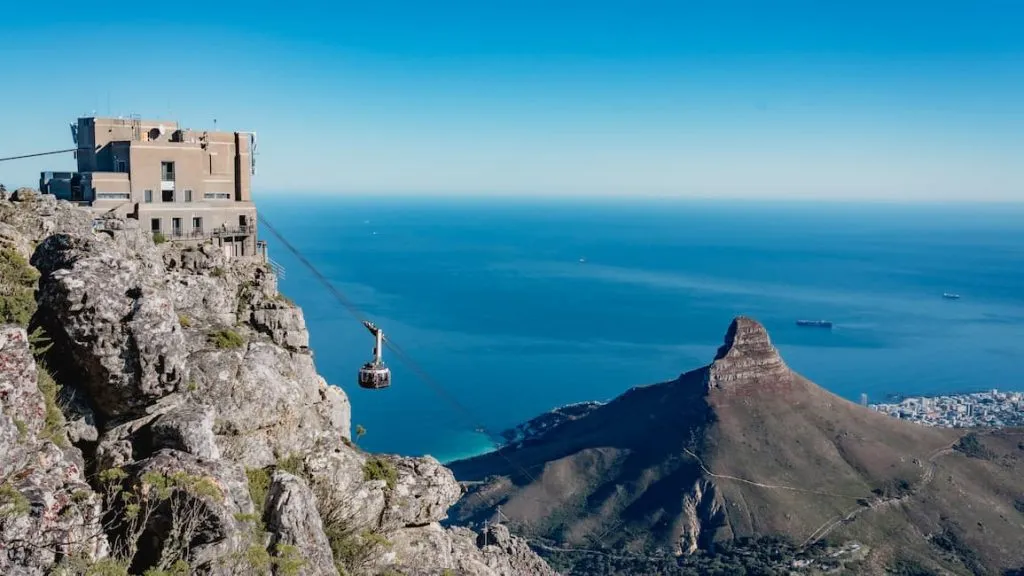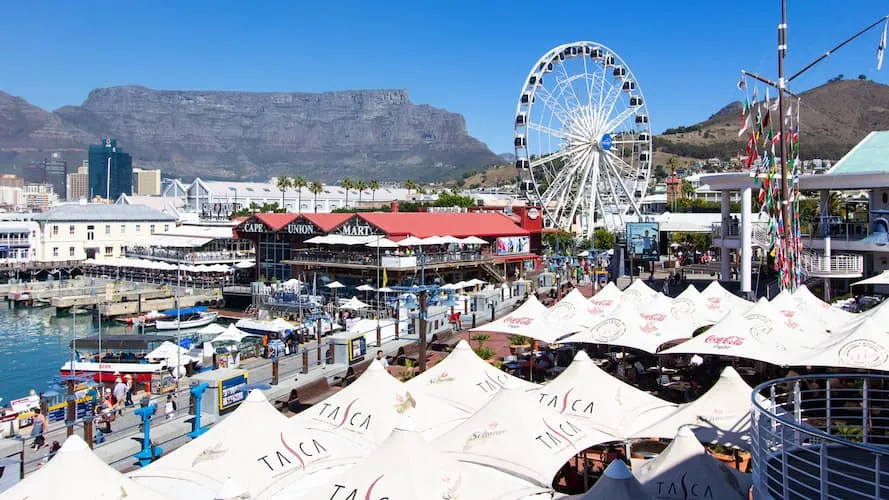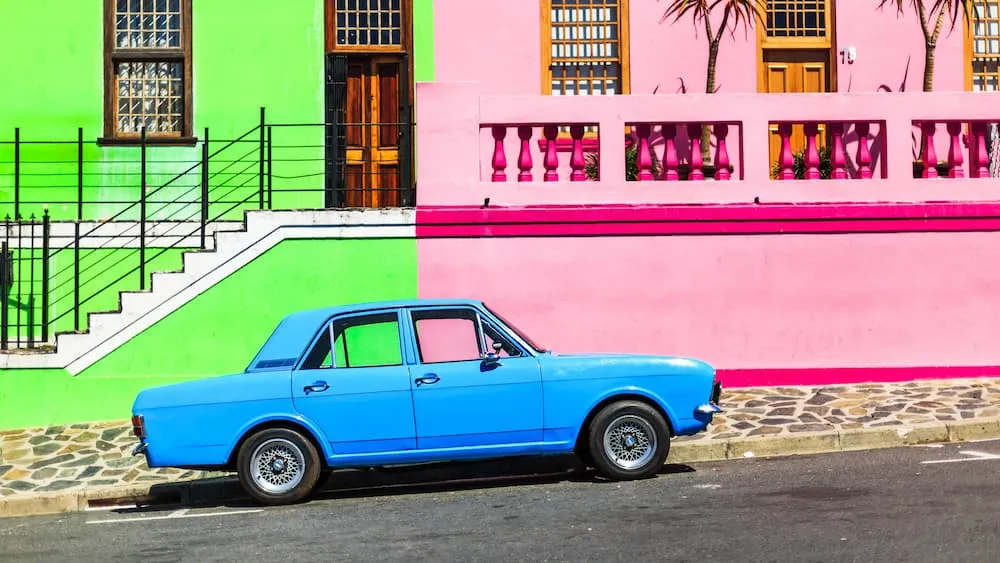Cape Town is one of those cities that offers a bit of everything, with mountains, beaches, good food, and a mix of cultures and history. It’s a place where you can hike in the morning, explore a museum in the afternoon, and watch the sunset over the ocean by evening. Whether you’re visiting for a few days or planning an extended stay, our “Ultimate Cape Town Travel Guide” will help you make the most of your time here. It includes the city’s top sights, some local tips, and practical advice to help you get around and plan your days.
Table of Contents
Top Things To Do in Cape Town 🏅
Table Mountain 🚠

Start with Table Mountain. It’s one of the city’s most well-known landmarks, and for good reason. You can hike up if you’re feeling active or take the renowned Table Mountain Cableway to rather save your energy. The views from the top are great on a clear day. You’ll see Table Bay with the iconic Robbern Island to the north past the city centre, while looking east, there’s the Hottentot Holland mountain range with Stellenbosch in the distance. Move round to the south-western side of the upper cable station and you get to see the 12 Apostles and the coastline from Clifton to Campsbay and beyond. But be warned – if you decide to hike up Platteklip Gorge, go early in the morning and bring water. It can get hot fast, and the trail is steep. A Cape Town trip is really incomplete without watching the sun setting or rising from the top of Table Mountain!
V&A Waterfront ⛴️

Next up is the V&A Waterfront. It’s busy and built up, but there’s a lot to do in one place: restaurants, shops, boat tours, and even the locally-loved Two Oceans aquarium. You can catch the ferry to Robben Island here, which is a must if you’re interested in South Africa’s political history. Tours are led by people who were once imprisoned there, and they tell you about life under apartheid in a direct and personal way. The ZEITZ MOCAA museum is also a must-visit if you’re intrigued by art and want to see the best of up-and-coming African artists.
Bo-Kaap 🏘️

Bo-Kaap is another key stop on any Cape Town visit. The neighbourhood is famous for its brightly colourful houses, which make for a perfect photo op! However, the area has deep roots in Cape Town’s history and Cape Malay culture. It’s home to many descendants of previously enslaved Cape Malay people who have their own unique food, culture, and religious traditions. You can walk around on your own or join a short walking tour to learn more. If you like food, try a Cape Malay cooking class or grab a bite at one of the local restaurants.
Cape Point 🌊


Cape Point is a bit farther out, but it’s worth the trip. It’s located in the Cape of Good Hope Nature Reserve and offers dramatic coastal views, a historic lighthouse, and a few delightful walking trails. The drive there, especially along Chapman’s Peak Drive, is one of the best in the region. You can combine it with a stop at Boulders Beach to see the African penguin colony on your way back to Cape Town. This quaint colony is one of the few places in the world where you can see them up close, and the beach itself is calm and sheltered.
First Thursdays 🖼️


First Thursdays are an awesome way to dive into Cape Town’s cultural vibe. Held on the first Thursday of every month, art galleries, studios, and cultural venues around the city welcome everyone for free. The night comes alive as the streets turn into a vibrant mix of art, music, and food. Various eateries and pop-up markets join in, serving up delicious bites and drinks while you explore the urban scene. It’s a fantastic way to soak up the local atmosphere!
Website: https://first-thursdays.co.za/cape-town/
Vineyards 🍇


The vineyards in and around Cape Town offer some of the best wine estates in South Africa. From wine tastings to tours to vineyard dining, you’re sure to find an opportunity to take part in one of Cape Town’s most authentic experiences. You don’t have to travel far. Constantia is within the city and has several historic wine estates open for tastings, including Constantial Uitsig, Groot Constantia, and Beau Constantia. If you have a day to spare, head out to Stellenbosch or Franschhoek, both about an hour away. Wine tours are easy to book, or you can drive yourself if you want more flexibility. Local beers and craft gins are also popular and found on most menus around town.
Food & Drink in Cape Town 🍴


Cape Town has a strong food culture and is a necessary experience for any Mother City visit. There’s a broad mix of local and international options. You’ll find everything from high-end restaurants to casual takeaways and food markets. Local dishes are worth trying – bobotie (a baked spiced mince with an egg topping), Cape Malay curry, and the Gatsby, which is a massive sandwich packed with fries, meat, and sauce. It’s often shared, but if you’re hungry enough, go for it solo.
Seafood is fresh and easy to find. Try grilled snoek, kingklip, or a classic fish and chips in any harbour. Kalk Bay and Hout Bay are both good spots if you want to eat seafood with a sea view. If you’re vegetarian or vegan, you’ll have no trouble; Cape Town has plenty of plant-based cafés with creative menus.
Markets are a good way to sample a bit of everything. The Neighbourgoods Market at the Old Biscuit Mill in Woodstock is a Saturday favourite, packed with food stalls, local vendors, and a lively crowd. On weekends, there’s also the Oranjezicht Market near the V&A Waterfront, which is slightly more relaxed and has excellent views of the ocean. Cape Town also has a buzzing nightlife with trendy bars with the best cocktails to rowdy dives for an adrenaline-pumping night out!
Where to Stay 🏨


Cape Town has accommodation options for every budget and travel style. The key is choosing the right neighbourhood, as the city is spread out, and each area has a different feel.
If you want to be near the beach with lots of restaurants and a relaxed vibe, Camps Bay is a good pick. It’s more expensive, but the views and sunsets are hard to beat. Sea Point is a bit more affordable, still close to the water, and has a long promenade for walking or jogging. The City Bowl, which includes neighbourhoods like Gardens and Tamboerskloof, is central and convenient for access to Table Mountain, downtown attractions, and lots of restaurants and bars
For luxury stays, places like The Silo Hotel or One&Only offer high-end service and good locations. There are also plenty of mid-range guesthouses, boutique hotels, and budget hostels or backpackers. Many with shared kitchens and social areas if you’re looking to meet other travellers. Airbnb is widely used and gives you a chance to stay in local neighbourhoods.
Travel Tips & Essentials☑️

Cape Town is fairly easy to navigate once you get used to the pace, but there are a few things you should know. This Cape Town travel guide will show you some tips to help avoid common issues and make your trip smoother.
When to Go🕰️
Cape Town’s summer (December to February) is hot, dry, and busy. It’s great for the beach and outdoor activities, but prices and crowds go up. Spring and autumn (October to April) are ideal. The weather’s still warm, but things are a bit quieter and more affordable. Winter (June to August) brings rain and cooler temperatures, but it’s not a bad time to visit if you’re into hiking or want to avoid crowds. It’s also whale watching season along the coast.
What to Pack🧳
The weather changes quickly here, especially around the mountain, so bring layers. You’ll want shorts and light shirts for the day and a hoodie or jacket for the evenings. Comfortable walking shoes are a must, especially if you’re doing any hikes. Don’t forget sunscreen—the sun is strong even when it’s cloudy. Bring a travel adapter (South Africa uses Type M plugs) or pick one up when you arrive.
Safety🔐
Like any major city, Cape Town has areas where you need to stay alert. Petty theft (pickpocketing, bag snatching) can happen, especially in crowded places or if you’re distracted. Don’t flash your phone or valuables. Stick to busy, well-lit areas at night and avoid walking long distances after dark. Ask your hotel or host if you’re unsure about a specific area, as they’ll usually give honest and helpful advice. Most visitors have no issues, but it’s good to stay aware.
Useful Apps📱
- Uber – your go-to for getting around
- Google Maps / Waze – accurate and reliable for walking and driving
- SnapScan – local mobile payment apps used in some cafés and markets
- Checkers Sixty60 / Mr D – food and grocery delivery apps if you’re staying in an Airbnb
Cape Town is easy to enjoy and hard to forget. With a mix of nature, culture, history, and good food, it offers a well-rounded experience no matter what kind of traveller you are. Depending on your interests, you can keep your days relaxed or pack them with activity. This guide should give you a solid starting point to plan your trip and make the most of your time there. With a bit of planning and some flexibility, you’ll be able to see the highlights, try some great food, and get a feel for what makes Cape Town unique






